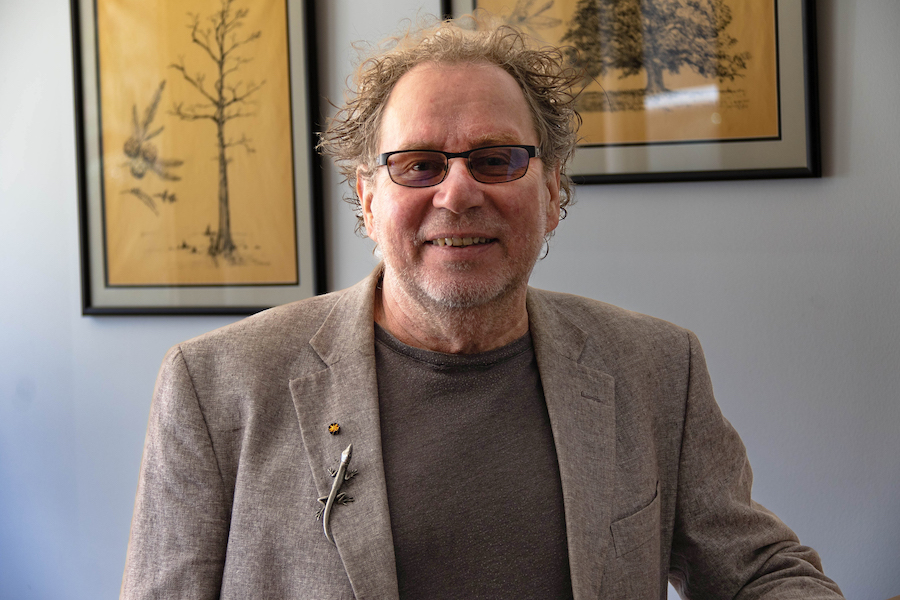Faculty Spotlight: Peter Beerli

Peter Beerli serves as a professor and chair of the Department of Scientific Computing at Florida State University’s College of Arts and Sciences. Beerli earned his Ph.D. from the University of Zurich in Switzerland and came to the U.S. in the 1990s as a post-doctoral researcher at the University of Washington in Seattle. Beerli’s research interests lie in evolutionary biology, specifically population genetics and phylogenetics, which combine math and biology.
Tell us a little about your background and what brought you to FSU.
I grew up in Switzerland with three siblings. Despite no one in my family ever attending university, I pursued higher education in biology. My academic interests began in herpetology, which is the study of reptiles and amphibians. During my undergraduate studies, I was the director of an amphibian survey in the Canton of Thurgau when I learned about computing. However, because it was the 1980s, no formal computing or programming classes were available at my university. Within two years, I became a part-time computer programmer for a Swiss bank. Soon after that, I started an ecological consulting business with a friend while working on my master's and doctoral degree in zoology.
In 1994, my family and I moved to Seattle, Wash. for my postdoctoral position in the Department of Genome Sciences at the University of Washington in Seattle. I stayed there for nine years working on computational methods to infer population models from genetic data as a research associate and research assistant professor. I then moved to a more permanent position as an assistant professor at FSU in 2003.
Can you break down your areas of academic interest for us?
Population genetics was 'invented' to combine Darwinian evolution and Mendelian genetics. Since then, it has played a key role in shaping biological theory and explains how species are related to each other. Once automatic DNA sequencing became feasible in the late 1980s, evolutionary biologists commonly used phylogenetic analysis to examine species interconnections. My research at the Department of Scientific Computing describes new algorithms and software methods to estimate the evolutionary past of species using present-day genetic data and data simulation. We generate synthetic data and test our models on these data to verify our software. Verification of our computing methods is often done in collaboration with researchers from the Department of Biological Science at FSU.
What makes you passionate about your topics of research?
I consider myself a toolmaker. I create software that allows others to convert their data into statements about evolutionary processes. For example, I distribute MIGRATE, a software that models genomic data according to the potential historical interactions among populations. The outcome of this program estimates the routes of migration and possible sizes of these populations.
What do you want the public to know about your research? Why are your topics important?
My methods help biologists and epidemiologists evaluate the spread of diseases over long periods of time. My work is tied to mutational changes in genomes, so findings in this field are often measured in generations. For example, my methods are used to describe the evolution of SARS-Cov-2, influenza and HIV/AIDS and contribute to an overall understanding of diseases.
You earned your Ph.D. in Switzerland before coming to the states as a postdoc in 1994. What was that transition like and how does your international experience manifest in your professorship at FSU?
Moving to Seattle first allowed me to acclimate to the American cultural climate. However, I prefer the summer heat in Florida over the constant rain in Washington. My own experiences help me understand my international students' struggles, and I try to support them as much as possible.
Who are your role models? Are there certain people who have influenced you most in your life and career?
The most influential people in my career include Joe Felsenstein, my post-doctoral adviser and retired professor emeritus in the Departments of Genome Sciences and Biology at the University of Washington in Seattle, and Thomas Uzzell, my doctoral thesis advisor who is now a retired professor from the Academy of Natural Sciences at Drexel University in Philadelphia.
What is your favorite part of your job?
My favorite part of my job is implementing complex methods into programming code and watching it work. I also enjoy collaborating with graduate students on their research.
If your students only learned one thing from you, what would you hope it to be?
To be curious and stubborn.
